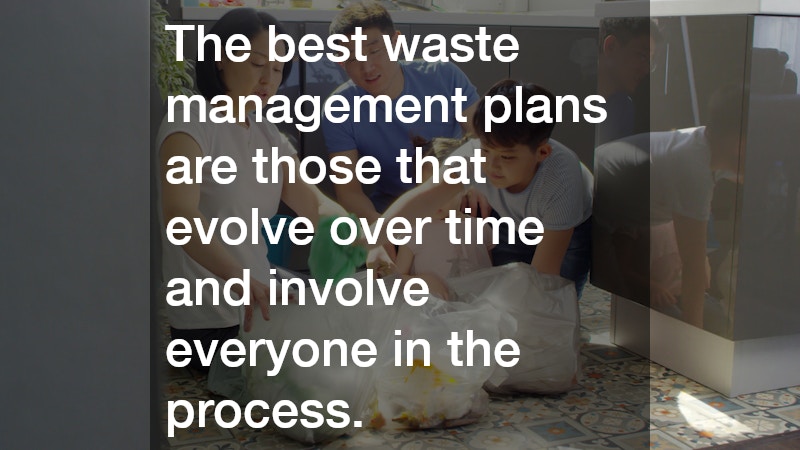Waste management is an essential part of running a sustainable home, business or community. As landfill sites fill and environmental concerns grow, effective strategies for handling waste have become more important than ever.
Whether you are managing a household, a commercial property or a large-scale project, having a clear and practical waste management plan is key to reducing your impact and promoting long-term sustainability.
Start With an Assessment
The first step in any waste management strategy is understanding the type and volume of waste being produced. This involves looking closely at daily habits or operations to identify where the most waste is coming from. For households, it could be food scraps, packaging or outdated items. For businesses, it may include office supplies, construction materials or customer-generated waste.
By reviewing waste streams, you can make smarter decisions about how to reduce output at the source. This might include choosing products with less packaging, shifting to digital solutions or sourcing reusable materials. Knowing your waste profile also helps set measurable goals and choose the right service providers or systems to support your efforts.
Implement the Waste Hierarchy
An effective waste management strategy should always follow the waste hierarchy. This means prioritising actions that prevent waste before resorting to disposal. At the top of the hierarchy is avoidance. This involves changes in purchasing decisions and behaviour that stop waste from being created in the first place. Reducing consumption, choosing durable goods and planning meals more effectively are simple yet powerful ways to avoid unnecessary waste.
Next is reuse, which encourages people to find new purposes for items instead of discarding them. Refillable containers, repairable products and second-hand markets all play a role in reducing the amount of material heading to landfill.
Recycling is the third step in the hierarchy. This process converts waste into new products, saving natural resources and energy. However, for recycling to be effective, it must be done properly. Contamination in recycling bins, for example, can lead to entire loads being rejected. Ensuring you understand local recycling rules and educating staff or household members makes a significant difference.
Only after these steps should disposal be considered. Even at this stage, responsible choices can be made. Partnering with companies that use ethical disposal methods or energy recovery systems keeps your strategy aligned with broader environmental goals.
Engage the Right Waste Services
For larger operations or busy households, working with a professional waste service provider can streamline your waste management plan. These providers offer bin hire, scheduled collections and detailed reporting that helps you track progress. They may also provide specialised services for hazardous waste, construction debris or organic matter.
Choosing the right service means asking questions about what types of waste are accepted, how materials are processed and whether the provider offers education or support for improving your waste habits. Many companies now align with green certifications and are transparent about how they contribute to reducing landfill use or supporting local recycling initiatives.
Regular reviews with your provider can uncover opportunities to improve. For example, they might suggest adjusting bin sizes, collection schedules or introducing new waste streams like composting or soft plastic recycling.
Create Awareness and Accountability
Education and consistency are essential when managing waste effectively. In a workplace, this could involve training staff, placing signage near bins or running internal campaigns that encourage better habits. In a home setting, clear rules and involving all family members in waste planning can build long-term habits and teach children the value of environmental responsibility.
Making waste visible is another useful strategy. Reviewing what ends up in bins and talking about how it could have been avoided can spark meaningful change. Over time, these conversations lead to better purchasing choices and fewer items needing disposal.
Setting goals and tracking outcomes can also help maintain momentum. Whether you are aiming to halve food waste, reduce office paper use or increase recycling rates, having targets in place encourages action. Sharing these results with your team or community adds another layer of accountability.
Monitor and Adjust Your Strategy
Waste management is not a one-time task. As your household grows, your business evolves or new products become available, your approach should adapt. Periodic audits are a good way to assess whether your waste strategy is still effective. These checks can reveal which initiatives are working and where improvements are needed.
Adjusting your plan might mean switching to a new service provider, adding more recycling bins or exploring emerging technologies like waste-to-energy solutions. Staying informed about changes in local council guidelines and national policies also ensures you are complying with legal requirements and taking advantage of available resources.
Implementing effective waste management strategies takes effort and commitment, but pays off in both environmental and financial terms. From assessing your waste profile and following the hierarchy to engaging the right services and building awareness, every step contributes to a cleaner and more responsible future.
The best waste management plans are those that evolve and involve everyone in the process. Whether at home or in the workplace, taking action today can help reduce your footprint and contribute to a more sustainable tomorrow.



